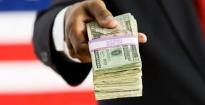DC Prepares for Debt Ceiling Fight
 The New York Times reports:
The New York Times reports:
WASHINGTON — The down-to-the-wire partisan struggle over cuts to this year’s federal budget has intensified concern in Washington, on Wall Street and among economists about the more consequential clash coming over increasing the government’s borrowing limit.
Congressional Republicans are vowing that before they will agree to raise the current $14.25 trillion federal debt ceiling — a step that will become necessary in as little as five weeks — President Obama and Senate Democrats will have to agree to far deeper spending cuts for next year and beyond than those contained in the six-month budget deal agreed to late Friday night that cut $38 billion and averted a government shutdown.
Republicans have also signaled that they will again demand fundamental changes in policy on health care, the environment, abortion rights and more, as the price of their support for raising the debt ceiling.
In a letter last week, Treasury Secretary Timothy F. Geithner told Congressional leaders the government would hit the limit no later than May 16. He outlined “extraordinary measures” — essentially moving money among federal accounts — that could buy time until July 8.
Once the limit is reached, the Treasury Department would not be able to borrow as it does routinely to finance federal operations and roll over existing debt; ultimately it would be unable to pay off maturing debt, putting the United States government — the global standard-setter for creditworthiness — into default.
The repercussions in that event would be as much economic as political, rippling from the bond market into the lives of ordinary citizens through higher interest rates and financial uncertainty of the sort that the economy is only now overcoming, more than three years after the onset of the last recession.
Given the short time frame for action and the prospect of an intractable political clash, leaders in both government and business are already moving to avert a crisis that most likely would be “a recovery-ending event,” as Ben S. Bernanke, the Federal Reserve chairman, testified recently in the Senate. He described a sequence of events that “would cascade through the financial markets,” provoking another credit crisis like that in 2008 and causing interest rates to jump.
Mr. Geithner has been meeting privately with senior lawmakers of both parties to underscore the economic stakes. At the White House, Mr. Obama’s chief economic adviser, Gene Sperling, peeled away from the spending fight in recent weeks to turn nearly full time to developing the administration’s strategy for the debt-limit debate. Central to that, administration officials say, is whether Mr. Obama initiates bipartisan talks on a long-term debt-reduction plan that tackles taxes, military spending and fast-growing entitlement programs like Medicare and Medicaid.
Executives of the nation’s largest financial institutions in recent days met with Mr. Geithner, House Speaker John A. Boehner, Republican of Ohio, and other lawmakers, arguing for the importance of raising the debt ceiling. Jamie Dimon, the chief executive of JPMorgan Chase, told them that his bank had devised contingency plans to protect its global business in the event of a default.
“If anyone wants to push that button, which I think would be catastrophic and unpredictable, I think they’re crazy,” Mr. Dimon said recently at the United States Chamber of Commerce.

